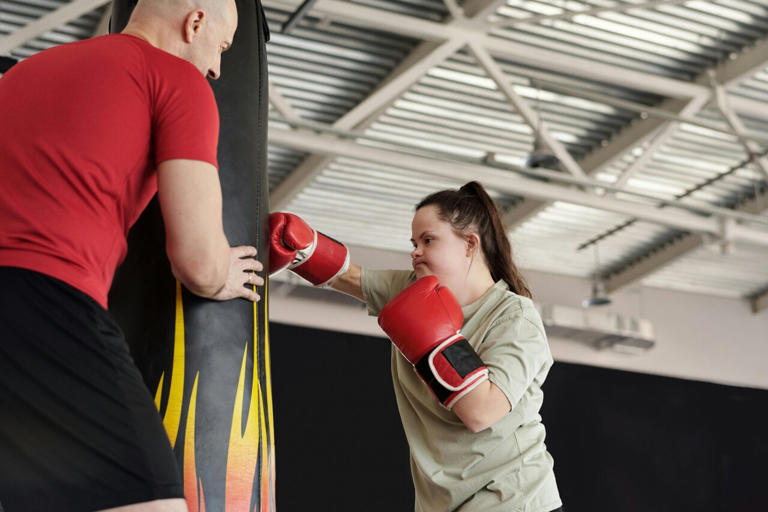Physical Activity and Cognitive Training for Adults with Down Syndrome
Mood Enhancement and Well-Being: How Exercise and Mental Training Can Benefit Adults with Down Syndrome
Everyone needs to feel content and joyful, and adults with Down syndrome are no different. Good news! According to a recent study called the Mindsets study, which was published in the International Journal of Environmental Research and Public Health, physical activity and cognitive training can greatly enhance mood and general well-being for this demographic [1].
Table of Contents

Physical Activity and Cognitive Training for Adults with Down Syndrome
Not only is this wonderful news for those who have Down syndrome, but it’s also great news for their families and caregivers. Let’s examine the study’s conclusions in more detail and consider the benefits of implementing these actions.
The Magic of Movement: Engaging in Physical Activity to Elevate Your Mood
Boost Mood & Wellbeing: Physical Activity & Cognitive Training for Down Syndrome
Eighty-three adults with Down syndrome, ages 18 to 48, participated in the Mindsets study. For eight weeks, participants in the program blended cognitive training with physical activity. Across the board, the group’s mood significantly improved, according to the researchers [1].
So how does exercise contribute to a more positive outlook? There are numerous explanations that could apply:
Boost Mood & Wellbeing: Physical Activity & Cognitive Training for Down Syndrome
Exercise has been shown to cause the brain’s natural mood enhancers, endorphins, to be released. These substances enhance positive and contented emotions [2].
Reduction of stress: Engaging in physical activity can help effectively manage stress. Exercise promotes mental clarity and positivity by assisting the body in burning off stress chemicals [3].
Better sleep: Getting regular exercise can help you get higher-quality sleep. Getting enough sleep is essential for emotional control and general wellbeing [4].
Social interaction: Engaging in physical activity might take place in a group or solitary environment. Joining a sports team or taking group fitness courses might offer social contact chances that can help fight feelings of isolation and loneliness and promote a happier mood [5].
Physical Activity Examples:
Physical activity selection for persons with Down syndrome should take their unique preferences and abilities into account. To get you going, consider these suggestions:
Walking is an easy-to-do activity that is convenient to do practically anywhere.
Boost Mood & Wellbeing: Physical Activity & Cognitive Training for Down Syndrome
Swimming is a low-impact, joint-friendly workout that is appropriate for people of all fitness levels.
- Dancing: Dancing is a great way to express oneself, enjoy music, and get some exercise.
- Team sports: Playing team sports can be a terrific way to meet new people, develop cooperation skills, and keep active.
- Developing Mental Agility: Cognitive Practice for Improved Emotion
- In addition to physical activity, cognitive training exercises were included in the Mindsets study.
The news article doesn’t go into detail about the cognitive training program’s specifics, but research indicates that it can improve mood in a number of ways.
Boost Mood & Wellbeing: Physical Activity & Cognitive Training for Down Syndrome
- Enhanced self-efficacy: Cognitive training programs can assist people in learning new skills and enhancing their capacity for problem-solving. A happier perspective may result from this increased self-efficacy and sense of success [6].
- Decreased frustration: It might be annoying to have trouble focusing or remembering things. Memory and attention-focused cognitive training programs can assist people in handling these difficulties more skillfully, which lowers frustration and elevates mood [7].
- Better social interaction: Communication-focused cognitive training programs can help people with Down syndrome express themselves more clearly, strengthening social bonds and potentially improving mood [8].
Activities for Cognitive Training Examples:
Boost Mood & Wellbeing: Physical Activity & Cognitive Training for Down Syndrome
There are numerous options for cognitive training exercises. Here are few instances:
- Memory games: Memory-boosting games that require players to match objects or recall sequences can be beneficial.
- Brainteasers: Brainteasers and puzzles help sharpen cognitive abilities and increase brain activity.
- Acquiring novel abilities: Developing new interests or abilities, like learning a language or playing an instrument, can help to keep the mind active.
- It’s All About Reliability: Developing a Habit of It
The Mindsets study emphasizes how crucial consistency is to gaining the advantages of cognitive training and physical exercise.
Boost Mood & Wellbeing: Physical Activity & Cognitive Training for Down Syndrome
The eight-week program significantly improved participants‘ mood, indicating that consistent participation is essential.
The following advice will help you incorporate cognitive training and physical activity into your daily routine:
Find activities you enjoy doing because you’ll be less inclined to persist with them if they bore you.
Choose enjoyable and captivating activities.
Boost Mood & Wellbeing: Physical Activity & Cognitive Training for Down Syndrome
- Increase time and intensity little at first and then steadily. Avoid trying to take on too much at once. As your fitness improves, start off at a manageable level of activity and progressively increase the duration and intensity.
- Locate a workout partner: Maintaining your motivation and accountability when working out with a friend or family member can help.
- Establish reasonable objectives: You may celebrate your accomplishments and stay on course by setting realistic goals.
- Include it in your regular routine: Timetable


